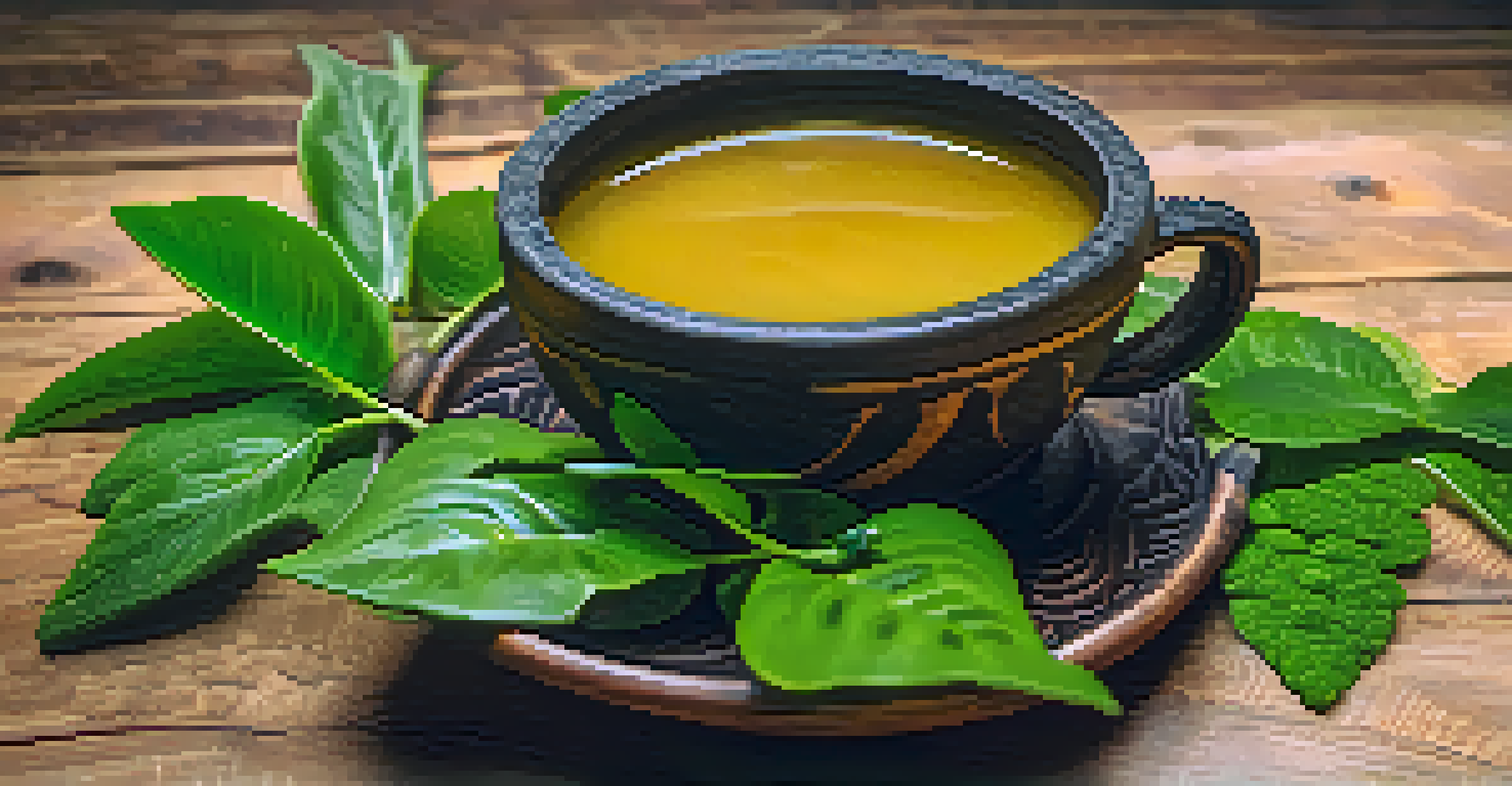Ayahuasca and Mental Health: Contemporary Ritual Practices

Understanding Ayahuasca: Origins and Uses
Ayahuasca is a traditional Amazonian brew made from the Banisteriopsis caapi vine and the Psychotria viridis leaf. Its origins date back centuries, utilized by indigenous tribes for spiritual and healing practices. The brew contains DMT, a powerful psychedelic, and is often consumed in ceremonial settings to foster deep introspection and connection with nature.
The experience of ayahuasca allows you to confront aspects of yourself you might have avoided, leading to profound insights and personal growth.
In contemporary society, ayahuasca has transcended its cultural roots, becoming a focal point in discussions about mental health. Many individuals seek out ayahuasca ceremonies as a way to confront personal issues, traumas, or mental health challenges. This blend of ancient wisdom and modern needs invites a deeper exploration of its potential benefits and risks.
While ayahuasca is celebrated for its transformative effects, it's essential to approach its use with caution. Understanding the cultural significance and potential psychological impacts is crucial, particularly for those considering participating in such ceremonies.
The Role of Rituals in Healing Practices
Rituals are integral to ayahuasca ceremonies, creating a sacred space for participants to engage with their inner selves. These rituals often involve guided meditations, singing of traditional songs (icaros), and the presence of experienced shamans. Such elements help participants navigate their experiences and provide a framework for understanding the insights gained during the ceremony.

The communal aspect of these rituals can also enhance their therapeutic effects. Sharing the experience with others fosters a sense of belonging and support, which is especially important for individuals facing mental health challenges. This connection can lead to a feeling of collective healing, where participants uplift each other through their journeys.
Ayahuasca's Cultural Significance
Ayahuasca is rooted in Amazonian traditions and carries deep spiritual and healing meanings for indigenous communities.
However, the effectiveness of these rituals can vary based on individual expectations and experiences. It's important for participants to approach these ceremonies with an open mind while also maintaining realistic expectations about the outcomes.
Psychological Benefits of Ayahuasca
Research has shown that ayahuasca can lead to significant psychological benefits, particularly for individuals dealing with depression, anxiety, and PTSD. Many participants report experiences of catharsis, where they confront and release pent-up emotions. This emotional release can pave the way for healing and personal growth, allowing individuals to reframe their life narratives.
Psychedelics can help us see the connections between our feelings and our thoughts, often leading to transformative moments of clarity.
Additionally, some studies suggest that ayahuasca may promote neuroplasticity, the brain's ability to reorganize itself by forming new neural connections. This can be particularly beneficial for those struggling with entrenched negative thought patterns. The potential for positive change in mental health perspectives adds to the appeal of ayahuasca as a therapeutic tool.
Nevertheless, it is essential to recognize that experiences with ayahuasca can be unpredictable. What may be enlightening for one person could be overwhelming for another. This variance underscores the importance of preparing adequately for such experiences.
Risks and Considerations of Ayahuasca Use
While ayahuasca has potential mental health benefits, it's not without risks. The intense psychological experiences can sometimes lead to challenging emotional confrontations; individuals may revisit traumatic memories that can be distressing. For some, this can exacerbate existing mental health conditions rather than alleviate them.
Moreover, the physical effects of ayahuasca can include nausea, vomiting, and other gastrointestinal disturbances, known as 'purging.' While this is often considered a part of the healing process, it can be unsettling for newcomers. It’s crucial for participants to discuss any medical conditions or medications with facilitators to avoid adverse interactions.
Psychological Benefits Explored
Research indicates ayahuasca may offer significant psychological benefits, particularly for those facing mental health issues like depression and PTSD.
As the popularity of ayahuasca grows, so does the number of unregulated retreats. Finding a reputable and ethical setting is essential to ensure safety and authenticity in the experience. Participants should conduct thorough research and seek recommendations before choosing where to engage in ceremony.
Cultural Context and Appropriation
As ayahuasca spreads beyond its Amazonian roots, discussions about cultural appropriation have surfaced. Many indigenous communities view the use of ayahuasca as a sacred tradition, and its commercialization raises ethical concerns. Participants must be mindful of the cultural significance and respect the traditions and practices of the indigenous people.
Ethical engagement involves acknowledging the origins of ayahuasca and seeking out ceremonies led by authentic indigenous practitioners. This not only honors the tradition but also promotes cultural preservation and respect. Understanding the historical context adds depth to the experience and enhances the potential for genuine healing.
Moreover, engaging with ayahuasca in a culturally sensitive manner encourages dialogue around mental health in diverse communities. It can foster greater understanding and appreciation for the wisdom embedded in indigenous practices.
Integration Post-Ceremony: Moving Forward
After experiencing ayahuasca, the integration process becomes crucial for translating insights into everyday life. Participants often benefit from talking with therapists or facilitators to help contextualize their experiences and incorporate lessons learned. This step is vital for ensuring that the emotional and psychological gains from the ceremony are not lost amid the challenges of daily living.
Journaling is another effective tool for integration. Writing down experiences, emotions, and reflections can provide clarity and reinforce personal growth. It serves as a tangible reminder of the journey and can assist in navigating post-ceremony life with intention.
Risks and Ethical Considerations
While ayahuasca can be transformative, participants must be aware of potential risks and the importance of ethical engagement with indigenous practices.
Ultimately, the integration process is a personal journey that can take time. Embracing patience and self-compassion is key as individuals work to weave their ayahuasca experiences into their life narratives.
The Future of Ayahuasca in Mental Health Treatment
As interest in ayahuasca continues to grow, researchers are increasingly exploring its potential within clinical settings. Preliminary studies suggest that structured ayahuasca experiences could complement traditional therapeutic approaches, offering new avenues for mental health treatment. This could lead to more widespread acceptance of psychedelics in mental health care.
However, the integration of ayahuasca into mainstream mental health practices will require rigorous research and ethical considerations. Understanding the nuances of its effects and ensuring safe practices is vital as the field evolves. Collaboration between traditional practitioners and mental health professionals may pave the way for innovative treatment models.

As we look ahead, the conversation surrounding ayahuasca and mental health will likely continue to expand. By fostering a respectful dialogue and prioritizing safety, ayahuasca may find its place as a valuable tool in the mental health toolkit.